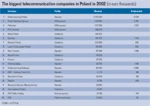Please hold to be connected
-

- Sławomir Kosieliński,
- 19.04.2004
As late as in mid 90s many people in Poland had been waiting for a phone line for over 20 years. Today, they give up on fixed phone services and buy mobile phones.
As late as in mid 90s many people in Poland had been waiting for a phone line for over 20 years. Today, they give up on fixed phone services and buy mobile phones.
45 years of communist dictatorship killed the joy of using the phone in Poles. "This is not something to talk about on the phone" - people used to say and arranged to meet in town. All this for the fear of phones being tapped by the communist security services. Anyway, it was easier to arrange a meeting than to get somewhere through. The phone was in great demand and the authorities could assign it to citizens according to some undefined principles. Members of the communist party, those working for the government could count on their phone application being processed in a short time period, ranging from a few weeks up to a year. Others, considered by the authorities as disloyal, or having the bad luck to be living in an area without the phone network, could be kept waiting for years.
The total control over communications was at the core of a police state. For instance, no connections to the seaside areas were possible in the memorable August of 1980, when Lech Wałęsa, Poland's future President, organized a strike in the Gdańsk Shipyard as the leader of Solidarity. The authorities blocked all phone lines hoping that this would block the flow of information on the events in the shipyard. It didn't help much because other communications channels worked out.
The same procedure was used a few months later when the authorities announced martial law on December 13, 1981. All phone lines, even the emergency ones, were blocked. After the communication had been reestablished, Poles picked up the phones to hear the unforgettable vioce that announced: "the call is being supervised, the call is being supervised…". How could the telecommunications sector be developing, when one had to wait more than ten hours for having a long-distance call connected (one could also order the so-called instant call, waiting period - two hours)? In order to make an international call, one had to count on a lucky break or have some friends in the international central office.
The Round Table brings down the Berlin Wall

The biggest telecommunication companies in Poland in 2002 (in euro thousands)
The development was hampered by the condition of the Polish telecommunications infrastructure. In the early 90s, the fixed telephony penetration of the domestic market reached 10%. The situation was worse only in Albania. A time- and energy-consuming creation process of the telecommunications market began.
Obviously, the development depended on the state policy towards the monopolist, i.e. the National Office of Telecommunications and Post, which was later renamed Telekomunikacja Polska Przedsiębiorstwo Państwowe (Polish Telecom State Company - owned by the State Treasury), and in 1997 transformed into Telekomunikacja Polska SA (Polish Telecom Joint-Stock Company). TPSA has long remained in the mentality of the previous era, although socialism was over. Despite enormous changes within the company, TPSA is still perceived as a relic of the past. By the way, many people are shocked to hear TPSA representatives say that the company is not state owned and that each decision has to be preceded by cold business calculation. This is unfavorable not only to the Internet users, who pay exorbitant bills, but also to regular users, for instance those in rural areas. It is difficult to talk TPSA, with its new image, into greenfield investments. However, the situation is changing quickly. When competitors begin to develop their cable network at one end of a village, TPSA immediately starts at the other end.
Undoubtedly, this has occurred due to the erroneous strategy of market deregulation.
Unlike all over the world, the deregulation process started with local calls in 1990. This could not work out, especially as TPSA went to any lengths to give its competitors a hard time, for instance, by offering unreasonable interconnecting rates. Additionally, it did not agree to a small number of joint points of separate networks, arguing that the long-distance traffic may be blocked.
A slight attempt at the deregulation of the long-distance calls market was made only after ten years of transformation. France Telecom and its partner Kulczyk Holding acquired TPSA shares in 2000 (the funny thing is that the shares of the Polish State in the company were taken over by the French government, which then owned 60% of France Telecom shares). However, as it frequently happens on a monopolized market, the first long-distance call providers - Netia1, Energis and NOM - did not start their operations on July 1, 2000. It happened only six months later. On top of that, the international call services market, which is usually the first segment to be liberalized, ceased to be dominated by TPSA only a year ago. However, the Polish government is to be blamed here, since it agreed on such a provision in the TPSA privatization agreement signed with France Telecom, as an additional incentive to investment.
No wonder that three years ago Poland's fixed phone network was the least developed among the OECD countries (27 phone lines per 100 inhabitants). Prices of telecommunications services in fixed networks, including the Internet access, placed themselves among the highest. The current situation has not much improved. The fixed telephony penetration is about 32% and, what's worth noting, is going to remain steady. Why? Stay with us.

